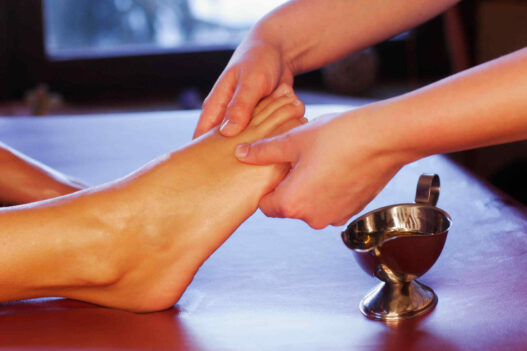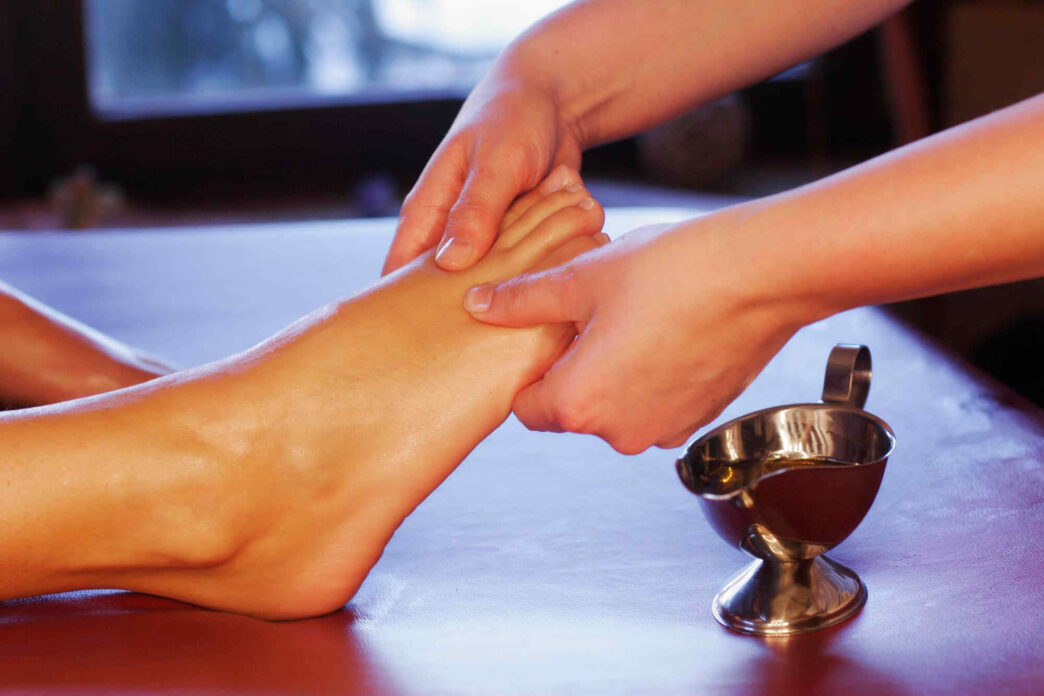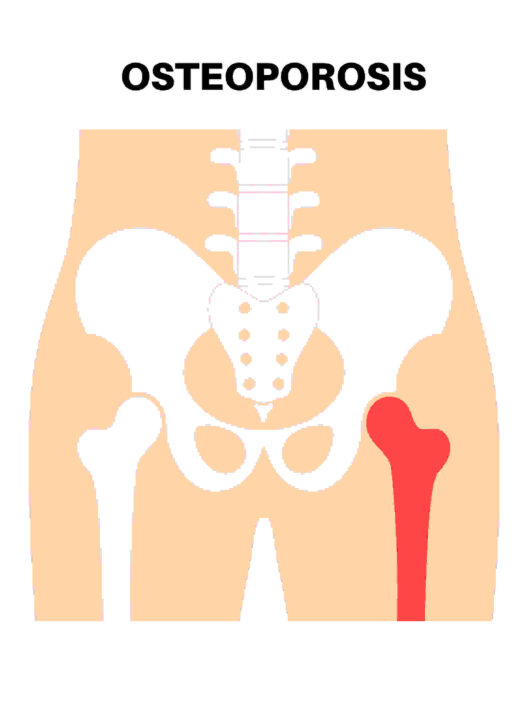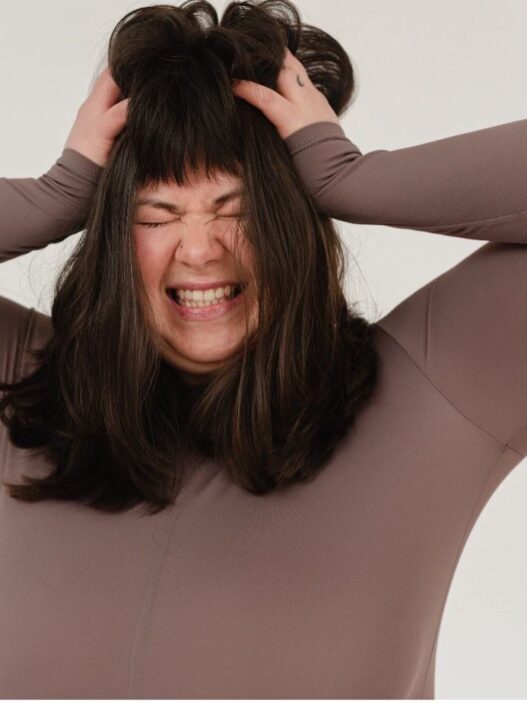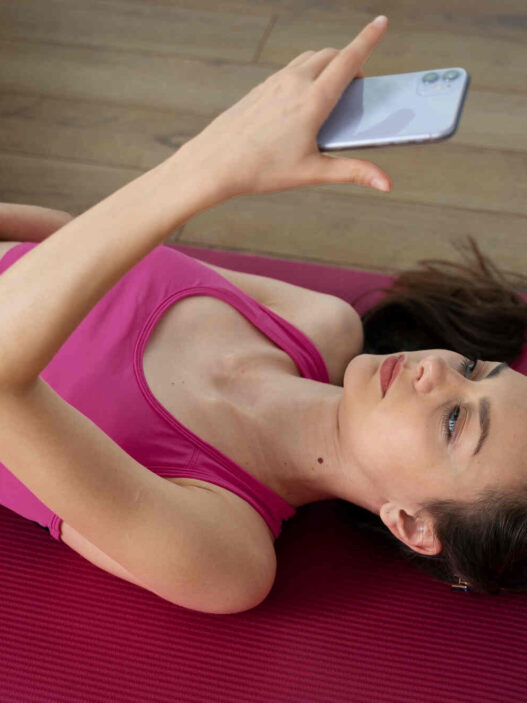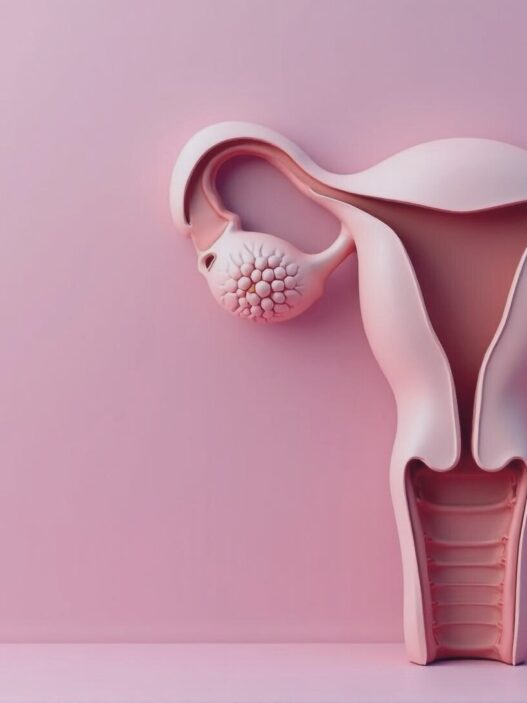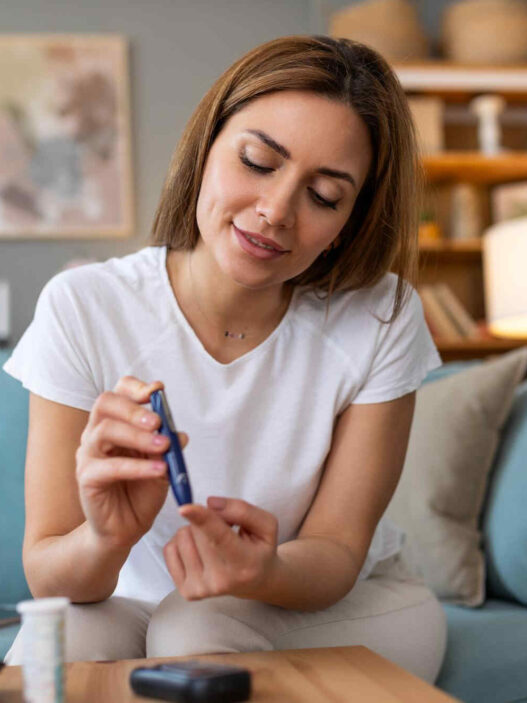What is Aroma Point Therapy? Internationally recognized menopause coach and medical qigong practitioner explain how combining essential oils in menopause with fragrance notes at 3 levels – Wei Qi, Ying Qi, Yuan Qi, and Vetiver essential oil with acupuncture points can ease menopause symptoms.
Introduction to Aroma Point Therapy and How It Works
Aroma Point Therapy is a gentle, safe, and effective treatment modality that combines the energetic treatment potential of pure essential oils and acupuncture points. Treatment involves placing the essential oils on specific points on the body to trigger energetic changes that will bring you back to a state of balance. In this blog, I explain how to use essential oils such as Vetiver essential oil, AnMian, and others for menopause symptoms.
Background and History
Aromatic plants for symptom and disease management date back thousands of years.
Essential oils were first extracted from aromatic plants by alchemists 2000 years ago, and then in the fourteenth century in France, these oils became valuable remedies in European pharmacy and were listed in pharmacopeias and dispensatories.
Essential oils provide a range of therapeutic benefits for addressing a variety of health concerns through inhalation (aromatherapy), topical application, and for certain conditions ingestion, though the latter should only be undertaken under the supervision of a highly skilled and qualified practitioner.
Symptom categories that essential oils can help to alleviate include mental health issues like anxiety, stress, low moods, and sleep disruption; Physical pain including joint and muscular issues, headaches, and gastrointestinal complaints. All of these are common symptoms of perimenopause and menopause, and hence essential oils can be used.
How does Aroma Point Therapy work?
In Western medicine, it has been shown that the fragrance of an essential oil travels through the olfactory system to the limbic system, which is part of the brain that controls emotions, memory, and stress response. Aromatherapy can modulate brain hormones and messages sent to the hypothalamus and pituitary gland. These signals can result in changes in perception, cognition, mood, blood pressure, and even sleep patterns.
In traditional Chinese medicine, the basic premise is that essential oils are energetically active on acupuncture points, in a similar way to acupuncture needles. Additionally, the essential oil can effectively and safely engage and amplify a particular acupoint function in a way that an inert needle cannot.
The mechanism of action at work is believed to be that the oils can activate peptides connected with the points and this transmits messages and actions through the meridian energy pathways to specific target tissues and organs.
The simplest explanation, however, is the universal principle of reciprocal resonance. Oils and points possessing a similar quality and function will energetically resonate with each other and create a particular sonic vibration leading to a therapeutic effect.
How Are Aroma Point Therapy Treatments Done?
A wide variety of oils are used in customized treatments that are applied topically. These can be a stand-alone treatment but also combine well with Acupuncture or Energy Work like Reiki.
During a treatment, a drop of essential oil, diluted in a suitable carrier oil such as almond oil, is lightly applied to the acupoint with a finger or cotton swab and held in place for a short amount of time. The practitioner will select one or more treatment sequences or patterns that typically involve activating between several acupressure points.
Fragrance Energetics & Notes of Essential Oils
In Traditional Chinese Medicine, there are 3 levels of Qi (energy) – called Wei, Ying, and Yuan – and these levels also relate to the fragrance notes of essential oils – Top, Middle, and Bottom Fragrance notes.
Top fragrance notes essential oils – Wei Qi level oils
Top fragrance note oils are distilled from the outer parts of plants, like citrus peels and leaves. In TCM, the Wei Qi level is on top as this is all to do with our outer level of consciousness and experience. Top Fragrance Notes are like the first impression – the surface layer – of an aroma.
The Wei level has an affinity with the lungs and breath. Its corresponding Top Fragrance Note oils are those which relieve acute upper body conditions – for example, those which treat common colds – as well as oils inhaled to awaken and uplift moods. Wei Qi blends for the mood to awaken and uplift the mood are useful in menopause when we feel a bit low, or tired or want quick relief from a hot flash. Lemon or Mandarin are great examples of top-note oils that work at the Wei Qi level.
Middle fragrance notes essential oils – Ying Qi level
The external Wei level moves into the Ying level, which is associated with the inner organs, blood, and emotions. Ying Qi level oils are Middle Fragrance Notes, and promote the movement of Qi because they work a little bit deeper into the body and last a little bit longer in the system. Middle Fragrance Notes are the body of an aromatherapy blend.
Ying Qi supports the immune system, the digestive system, and muscles. Ying-level oils combined with key acupuncture points can be helpful for common menopausal issues like mood swings, bloating, and constipation. Bergamot is a go-to essential oil that can activate Qi and harmonize imbalance in ‘middle’ organs like the Liver system and relieve irritability, frustration, and mood swings.
Base fragrance notes essential oils – Yuan Qi level
Yuan Qi level is the deepest level of energy and is associated with Base Fragrance Note oils. Yuan Qi is connected to our Jing, the life energy or essence. It is the energy associated with our DNA, our potential, and our creation. This is the deepest energy and has synchronicity with Base Fragrance Notes, which are derived from roots, resins, woods, and some flowers, and are grounding, earthy, deep-acting oils.
These oils work deeply to our core and help us descend into our Qi – to direct our energy downwards. This means these oils are excellent for grounding and meditation and the reproductive system. Yuan-level oils are associated with Yin energy and so they are often used to treat menopausal symptoms or those that manifest in the evening like insomnia and night sweats.
Easing Common Menopausal Symptoms
There are around 48 symptoms of perimenopause. Some of the most common symptoms that women report are hot flashes, night sweats, sleep disruption, anxiety, depression and low moods, fatigue, and exhaustion as well as unwanted weight gain.
Combining the right acupuncture points with selected essential oils for menopause can bring about relief to these and many other common menopause symptoms. In Chinese medicine, the underlying imbalance in perimenopause and menopause is referred to as yin deficiency or more specifically Kidney Yin deficiency. Therefore, the major treatment protocol is to nourish or tonify the Yin where these essential oils are used for menopause.
One of the best all-around essential oils for menopause that nourishes the Yin and clears the heat associated with hot flashes, that impact 80% of us at this time, is an oil from the Woody and Rooty category Vetiver. It operates at the Yuan Qi fragrance notes level.
When paired with the correct acupoints, this viscous and grounding Vetiver essential oil has the power to clear heat from the upper body (including hot flashes and night sweats) and stabilize symptoms such as anxiety associated with ungroundedness, brain fog, and insomnia.
Foot and ankle points pair best with Vetiver essential oil, and the combinations include the use of Kidney points notably K-1. Yuan Qi blends for night sweats can help if symptoms are intense: mix 3 drops of Frankincense, 2 drops of Patchouli, and 1 drop of Vetiver essential oil into 15ml Grapeseed oil and apply to the same acupuncture points as for Vetiver essential oil alone.
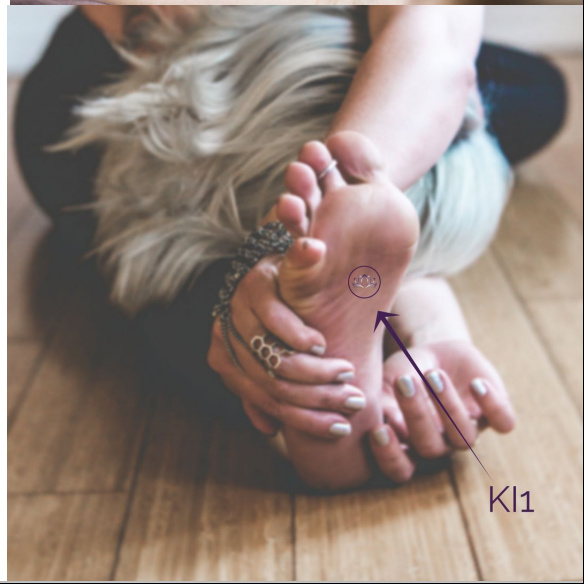
But if you need quick hot flash relief, try some Peppermint essential oil on the back of your neck! This is a great oil to keep close to hand day or night to cool the body and clear the mind.
Here below are some additional ways that Aroma Point therapy can be used to ease common menopausal symptoms that impact women’s health and quality of life.
Supporting Better Sleep
60% of women report sleep disruption in some form during the perimenopause and menopause years. Difficulty falling asleep and staying asleep can leave women feeling tired and wired, contributing to increased brain fog, moodiness, and weight gain as well as potentially impacting longer-term health. Poor sleep has been implicated as a contributing factor in cardiovascular health issues and dementia.
Vetiver essential oil is a go-to oil for menopause, but some additional essential oils in menopause are excellent for supporting us to fall asleep and back to sleep:
- Lavender
- Cedarwood
- Roman Chamomile
- Sandalwood
These oils can be used on several acupuncture points throughout the body.
The first one is called AnMian, which translates as ‘peaceful sleep’ when combined with Lavender, the recommended oil for an overactive mind that inhibits the ability to fall asleep. Activating this point has a mind-calming effect.
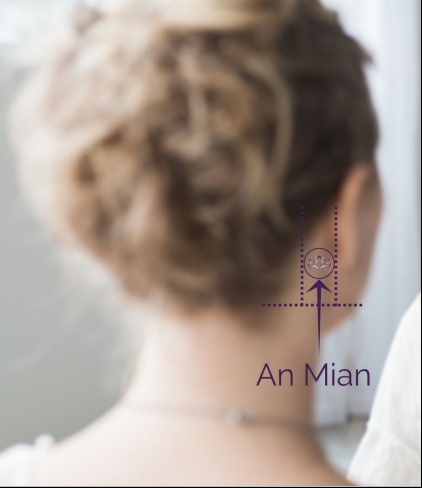
Another point is Heart 7 (H7) on the pinky side of the wrist crease, when used in combination with woody oils like Cedarwood or Sandalwood essential oil, overcomes difficulties in falling asleep or falling back to sleep that have their roots in menopausal anxiety. These oils are recommended for their ability to gather, and centre scattered qi that in Chinese medicine is said to prohibit the Shen (the spirit) from settling and allowing deep sleep.
Lifting Depression and Low Moods
Many menopausal women reports feeling a loss of joy and energy in menopause, Of course, there is no one cure and we must address the root of these emotions as each of us is individual.
What is common with expressions of depression is an energetic and physical constraint, a pathological nervous tension commonly affecting the Liver meridian and Wood element in Chinese medicine.
Depression is described as Liver Qi stagnation in Traditional Chinese Medicine. The way to treat this is to free the flow of qi in the Liver meridian, and the best point for that is Liver 3 (LV3) and the preferred oil is Bergamot essential oil.

In perimenopause, feeling a sense of disconnection from life is common. Here Aroma Point therapy can rekindle inspiration. Blue Tansy is a wonderful essential oil that can facilitate the reconnection of aspiration to inspiration. This is a profound treatment that can help people see beyond obstacles (often this shows up in our ways of thinking) and move forward propelled by renewed hope.
Blue Tansy is a middle-tone essential oil with a wonderful Sweet-Green aromatic quality. It can both harmonize and move stagnation, particularly as it relates to the Liver meridian. Applying Blue Tansy to LIV-3 also helps resolve stuck anger, smooth, encourage flexibility in life and resolve pain caused by stagnation and inflammation.
Very often, depression comes from the constraint created by worry and overthinking, which can affect our digestive system. Here citrus oils can uplift the mood while clarifying that bogged-down mind of over-worry. Use these on spleen points.
Important Considerations
As with all modes of use, you must know the source for purity, even for topical use, as 60-80% of what we put in our bodies gets absorbed into our bloodstream. What you put on your body will end up in your body.
Always buy essential oils from reputable companies that are either organic or where the oil can be traced to the grower.
Although many practitioners do use oils without dilution it is important to note that oils can trigger photosensitivity in the skin, and it may be advisable to dilute the oils in a neutral carrier oil like almond or grapeseed oil.
It is advised to start any use of Aroma Point Therapy by working with a recognized practitioner who can then provide a protocol for applying the correct oils and acupuncture points. This protocol can then be followed at home to further support the management of perimenopausal and menopausal symptoms.
In Summary
Aroma Point Therapy is a safe and gentle treatment that involves placing specific essential oils on specific Chinese acupoints to trigger energetic changes in the person. The acupoints are the same as those utilized in acupuncture, with essential oils replacing needles as the stimuli.
This therapy, combining essential oils in menopause and acupuncture points, can be highly supportive for women going through perimenopause and menopause to manage many of the common symptoms such as hot flashes, night sweats, insomnia, and mood changes. Aroma Point Therapy can be used alone or complement acupuncture and other forms of medication.
Source
Holmes P. Aromatica, vol. 2: A Clinical Guide to Essential Oil Therapeutics. Applications and Profiles. London: Singing Dragon; 2019.

Dr. Clarissa Kristjansson, Ph.D., is an internationally recognized menopause coach and educator, mindfulness, medical qigong and aroma point therapy practitioner focused on the positive and transformative nature of menopause. She is the host of the popular Thriving Thru Menopause podcast, author of the bestsellers The Mindful Menopause and “The Potent Power of Menopause: A Globally Diverse Perspective of Feminine Transformation” and creator of the Thrive coaching program.
